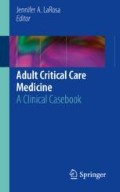Abstract
Brain death is a concept that was created by an ad hoc committee of the Harvard Medical School 50 years ago. It has become an accepted standard, along with cardiopulmonary criteria, to determine death. Many have taken this acceptance by the medical profession and society at large as vindication of the concept. In this chapter, we will evaluate the historical climate and historical figures that led to the development of brain death. A theoretical case will be presented outlining some of the difficulties developing in the fraction of patients that are declared dead using brain death criteria rather than cardiorespiratory criteria. A legal view of the inception and development of brain death will be discussed. In the end, we will question whether the dead-donor rule has, in the long run, led to more or less viable organs available for transplantation.
Access this chapter
Tax calculation will be finalised at checkout
Purchases are for personal use only
References
A definition of irreversible coma. JAMA. 1968;205(6):85–8.
Dean, C. Joseph E. Murray, transplant doctor and Nobel prize winner, dies at 93. New York Times. 2012, November 27.
Wijdicks EFM, Varelas PN, Gronseth GS, Greer DM. Evidence-based guideline update: determining brain death in adults. Neurology. 2010;74:1911–8.
Leatherberry WC. Heart transplants: legal problems and the need for new legislation. Case W Res L Rev. 1968;19:1073. Available at: http://scholarlycommons.law.case.edu/caselrev/vol19/iss4/17, citing Ayd, When is a person dead? Med. Sci Apr. 1976 at 33–34; and Fletcher GP. Prolonging life. Wash L Rev. 1967;42:999, 1001.
KAN. STAT. ANN. §77–202. 1970.
121 Pa. L. Rev 87. 1972.
President’s Commission for the Study of Ethical Problems in Medicine and Biomedical and Behavioral Research. Defining death: a report on the medical, legal and ethical issues in the determination of death. Washington, DC: Government Printing Office; 1981.
Spears v. Rosen, No. RG15760730. Ca. April 20, 2018.
Iverson KV. Dying to know: introduction. In: Iverson KV, editor. Death to dust: what happens to dead bodies? Tuscon: Galen Press, Ltd.; 1994. p. 11–49, 307–364.
McRae D. Every second counts. London: G. P. Putnam’s Sons; 2006.
Author information
Authors and Affiliations
Corresponding author
Editor information
Editors and Affiliations
Rights and permissions
Copyright information
© 2019 Springer International Publishing AG, part of Springer Nature
About this chapter
Cite this chapter
Shaw, M.H., Kaufman, D.C. (2019). Brain Death. In: LaRosa, J. (eds) Adult Critical Care Medicine. Springer, Cham. https://doi.org/10.1007/978-3-319-94424-1_12
Download citation
DOI: https://doi.org/10.1007/978-3-319-94424-1_12
Published:
Publisher Name: Springer, Cham
Print ISBN: 978-3-319-94423-4
Online ISBN: 978-3-319-94424-1
eBook Packages: MedicineMedicine (R0)

